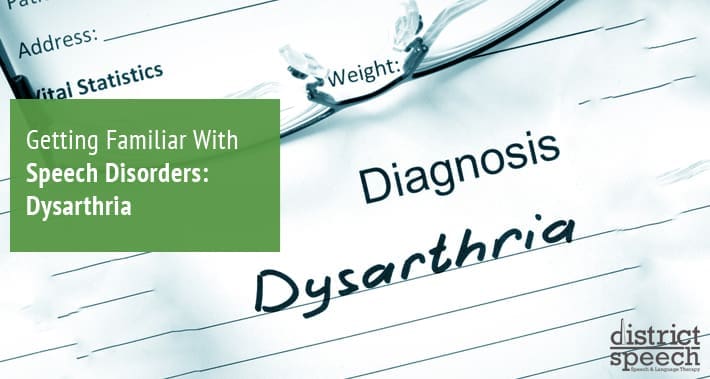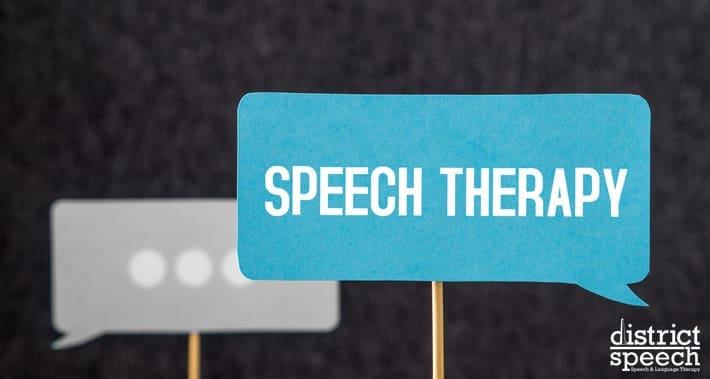
Are you getting feedback from others that it’s difficult for them to understand you when you talk?
Are you concerned that you might be having trouble speaking?
If so, you might benefit from speech therapy treatments for adults or speech therapy for children.
It’s also possible that you have dysarthria.
Dysarthria is a type of speech disorder which can cause difficulties at work, home, or school.
Keep reading to learn more about what dysarthria is and what you can do if you have it.
What Is Dysarthria?
Dysarthria is a speech disorder caused by muscle weakness, damage, or paralysis.
It can also be caused by damage to your nervous system.
Dysarthria is classified as a motor speech disorder.
There are a number of different neuromuscular conditions (diseases that affect the nerves controlling certain muscles) which can result in dysarthria.
Dysarthria is most common in people who also have neurological conditions, but it can be caused by other injuries to the brain or vocal muscles as well.
What Are The Symptoms Of Dysarthria?
The main symptom of dysarthria is that it makes it difficult for you to form and pronounce words.
Specifically, it may cause you to speak at a markedly different speed from your normal pace.
It might also cause you to slur your words or speak robotically, making it difficult for others to understand you.
You might also experience difficulty moving your lips, tongue, or jaw.
You might also notice that you sound breathy or nasal, or hoarse.
You might not experience all of these symptoms at the same time.
These are just some of the ways that dysarthria may be present.
You may have heard of another speech condition called childhood apraxia of speech, symptoms of which are similar to dysarthria because it is also classified as a motor speech condition.
Both conditions are concerned with muscle strength and the movement of the muscles.
Dysphagia is a condition that causes you to have trouble swallowing, and it can be a symptom of dysarthria.
While both of these other conditions are not the same as dysarthria, they can be related to it.
Are There Different Types Of Dysarthria?
Dysarthria types are differentiated by the part of the nervous system that is affected, as well as what caused it, and when in life it occurred.
Central dysarthria is the name for dysarthria that is caused by brain damage.
Peripheral dysarthria is the name for dysarthria that is caused by damage to the mouth, throat, or other organs used for speech.
Developmental dysarthria refers to dysarthria that is present either before or at birth.
This type of dysarthria is common among children.
Acquired dysarthria refers to dysarthria that is not present at birth.
If you have dysarthria as a result of a stroke or brain tumor, for example, that would be classified as acquired dysarthria.
What Causes Dysarthria?
Dysarthria can be caused by a number of different things.
Central dysarthria is caused by brain damage, so illnesses and injuries such as strokes, brain tumors, dementia, and certain medication side effects can cause dysarthria.
Neuromuscular diseases like cerebral palsy, Huntington’s disease, Parkinson’s disease, and various types of sclerosis, can also cause central dysarthria.
Peripheral dysarthria is caused by damage to your speech organs.
It can be caused by a condition you’re born with, or an injury to your throat, head, mouth, or larynx.

How Can Speech Therapy Treatments Help With Dysarthria?
A qualified speech language pathologist in Washington DC can help you improve your communication skills.
When it comes to dysarthria, a speech therapist’s role includes putting together a treatment plan for your unique speech needs.
When you are undergoing speech therapy for dysarthria, you can learn different exercises to practice at home.
Your speech therapist will recommend exercises to you based on your personal speech goals.
Some exercises can help you build strength in the muscles of your face and mouth.
Other exercises can help you achieve your desired speed and volume of speech and can also improve your articulation and clarity when speaking.
You will also learn tips for managing your dysarthria in everyday conversation.
A speech therapist can also work with your friends and family and teach them new communication strategies that will help everyone understand each other better.
Book Your Appointment With District Speech Today
If you think you might have dysarthria, or if you’re concerned about the quality of your verbal communication in general, book an appointment with District Speech.
At your appointment, you’ll meet with one of our qualified speech therapists and you’ll be able to share your concerns and speech goals with them.
You’ll also be able to ask questions.
Your speech therapist will be able to assess your needs and will work with you to design a treatment plan.
Book an appointment with District Speech today.
1300 I St NW, Suite 400 E,
Washington, DC 20005
- https://g.page/districtspeech
District Speech and Language Therapy specializes in speech therapy, physical therapy, and occupational therapy solutions, for both children and adults, in the Washington D.C and the Arlington Virginia areas.